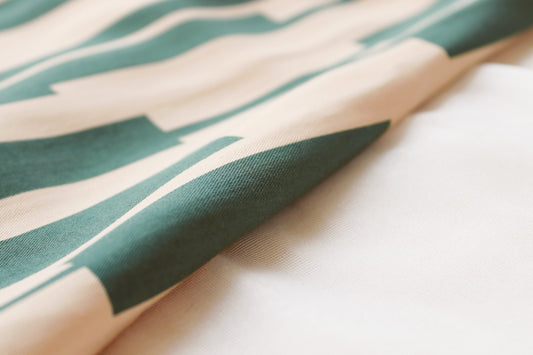
Natural Trims & Bits: Small Details, Big Impact | WorldWild
Share
It’s the little things that often go unnoticed. The subtle details – the kind that don’t shout for attention but make all the difference. We’re talking about the natural trims – those small, seemingly insignificant pieces that can transform your garment, and in turn, the world.
Ever thought about your buttons? Or the threads that hold your clothes together? No? Well, maybe it’s time you did. These "small details" are actually wildly powerful. They have the potential to shift the entire fashion industry towards something more sustainable. Intrigued yet?
The Tiny Things You Can't Ignore
Let’s take a moment to step back and appreciate the power of small details. You might be surprised to learn that the trims used in your clothes – the buttons, zippers, threads, and clasps – often come from the same unsustainable sources that we see in the fast fashion industry. Think about plastic buttons, polyester threads, synthetic zippers… they’re all contributors to pollution, waste, and the destruction of our planet.
But here’s the good news: natural trims are here to change the game. These aren’t just "decorative" additions – they’re key to creating a more sustainable, ethical, and conscious wardrobe. And they’re a game-changer for the planet.
What Are Natural Trims?
Natural trims are exactly what they sound like: they’re made from materials found in nature – think corozo nuts, coconut shells, wood, and biodegradable threads. These humble materials might not always get the spotlight, but they’re quietly supporting the global shift towards sustainability.
Here’s where it gets really interesting: most of these trims are biodegradable, renewable, and have a minimal environmental impact. They don’t just look good – they are good for the planet.
- Corozo buttons / Made from the nut of a tree in the rainforests of South America, corozo is known for its durability and sustainable nature. Unlike plastic buttons, corozo is completely biodegradable, making it an eco-friendly alternative to the toxic plastics flooding our landfills.
- Coconut shells / Used for buttons, buckles, and accessories, coconut shells are a byproduct of coconut farming, meaning no additional trees need to be cut down. And they’re biodegradable!
- Wooden buttons / Sourced from sustainably harvested forests, wooden buttons add a touch of natural elegance to your wardrobe, all while being biodegradable and environmentally responsible.
- Biodegradable threads / The humble thread – a tiny thing – but essential to stitching garments together. The thread used in sustainable fashion brands is made from natural fibers that break down over time, unlike synthetic threads that pollute our land and oceans.
The Big Impact of Small Choices
Now, here’s the magic: when you choose natural trims, you’re not just making your clothing more beautiful – you’re also making an impactful decision that contributes to a cleaner, more sustainable planet.
Let’s break it down:
- Less Plastic, More Nature / Every button and zipper that’s made from plastic is one more piece of waste that will outlive us all. By choosing natural materials, you’re saying no to plastic and yes to nature’s designs.
- Biodegradable Materials / Unlike synthetic trims, natural materials will break down and return to the Earth, leaving no trace behind. This is circularity in action – nothing goes to waste.
- Supporting Local Communities / Many natural trims, like corozo and coconut, are sourced from local communities that rely on these materials for their livelihood. By choosing natural trims, you’re supporting ethical practices and empowering artisans and farmers around the world.
The Fashion Revolution You’ve Been Waiting For
Here’s the wild truth: we’ve been taught to overlook the small details in fashion. We’ve been told that only the big, flashy pieces matter. But in reality, the true revolution starts with the details. It’s the small things – the trims, the buttons, the threads – that add up to create a world of change.
So, next time you look at a jacket or blouse, ask yourself: What’s holding this piece together? Is it plastic, or is it a natural trim that supports a circular fashion system? Is it biodegradable, or is it a future piece of waste?
You have the power to make this decision. You have the power to choose a wardrobe that’s not only stylish but sustainable. Every little detail matters. And when we all start paying attention to the small things, those little choices become a tidal wave of change.
The Hidden Danger: Conventional Threads
Here’s something that might surprise you: even if your garment is made from the most sustainable fabric, if it’s sewn with conventional polyester threads, it’s practically doomed. That’s right. The polyester thread – often used in mass-produced fashion – is not biodegradable. In fact, it prevents your clothes from being properly recycled.
Imagine this: a cotton shirt made with sustainable organic cotton and natural trims, but stitched together with synthetic polyester threads. When the garment’s time is up, the threads will hinder the recycling process, making it impossible to re-use or upcycle the fabric. The whole garment ends up in a landfill, defeating the purpose of sustainable sourcing.
That’s why it’s crucial to pay attention to the thread as much as you do the fabric. Natural, biodegradable threads can break down when the garment reaches the end of its life cycle. They allow the entire garment to be recycled or composted without leaving harmful materials behind.
Ready to Start Your Wild Revolution?
So here’s your challenge: next time you’re shopping, take a moment to think about the trims. Are you choosing plastic, or are you choosing wildly sustainable materials? Are you making a difference, one button at a time?
You may think it’s just a button – but that one button could be part of something much bigger. It could be part of a global movement to change how we make and consume fashion. And remember: sustainability doesn’t just start with the clothes you wear. It starts with the details.
Let’s make every small thing count. Let’s make the world better, one trim at a time.



